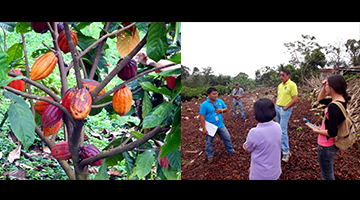 The Philippine Council for Agriculture, Aquatic and Natural Resources Research and Development (DOST-PCAARRD) visited the cacao and coffee projects at Misamis Oriental State College of Agriculture and Technology (MOSCAT), Misamis Oriental as part of the monitoring and evaluation of SARAI projects.
The Philippine Council for Agriculture, Aquatic and Natural Resources Research and Development (DOST-PCAARRD) visited the cacao and coffee projects at Misamis Oriental State College of Agriculture and Technology (MOSCAT), Misamis Oriental as part of the monitoring and evaluation of SARAI projects.
Dr. Felicino Calora Jr., Faustina Baradas, Engelbert Lalican, and Hanna Estrada of DOST-PCAARRD, together with Dr. Apolinario Gonzaga Jr., Dr. Rosalito Quirino, and Nelda Gonzaga of MOSCAT visited the International Center for Research in Agroforestry (ICRAF) Farm and the SARAI coffee project at Margaja Farm in Claveria, Misamis Oriental.
DOST-PCAARRD emphasized the importance of monitoring climatic data or parameters in the ongoing experimental setup in the two sites visited. The Council also recommended the installation and use of an automatic weather station (AWS). Moving forward, Dr. Gonzaga will furnish PCAARRD with the documentation or data regarding the yield of coffee and cacao at MOSCAT as well as its cultural management.
SARAI, an acronym which stands for Smarter Approaches to Reinvigorate Agriculture as an Industry, is an initiative of the University of the Philippines Los Baños (UPLB), Department of Science and Technology (DOST), and DOST-PCAARRD. The project aims to enhance the yield of rice, corn, banana, coconut, coffee, and cacao through technologies and strategies to minimize the effects of climate change.
MOSCAT was previously chosen for coffee R&D, its area of concern being predominantly planted with the said commodity due to its favorable climate for the growth of coffee and cacao compared to nearby areas. Moreover, it has an agromet station and manages more than 10 hectares of coffee plantation with various stages of growth and different farming systems. It also has 40 hectares of newly established or planted cacao plantation.
